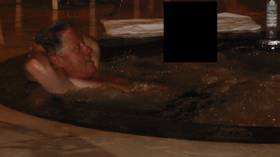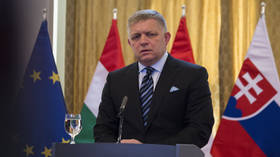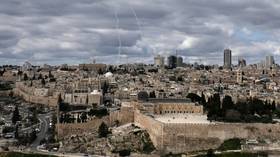‘Life for most Libyans is worse than it was under Gaddafi’
The UK and US are removing some diplomatic staff from Libya amid political unrest throughout the country. Professor Mark Almond told RT that the spike in violence is mostly due to Libya's state of disorder - which has worsened since Gaddafi's overthrow.
The US State Department said that it has “approved the
ordered departure of non-emergency personnel from Libya.” It
said that the US embassy in Tripoli would continue to remain
“open and functioning.”
A spokesman for the Foreign Office said that Britain’s embassy
is temporarily withdrawing a small number of staff - most of which
“work in support of government ministries which have been
affected by recent developments.”
Those “recent developments” refer to an increase in violence
which was sparked after two ex-rebels besieged two ministries last
month over a law that would ban officials who served under former
Libyan leader Muammar Gaddafi.
Since then, gunmen have surrounded the Libyan foreign embassy
and Benghazi has been the target of bomb attacks which left a
police station damaged.
Mark Almond, an international relations professor at Turkey’s
Bilkent University, says the violence is largely to do with the
country’s chaotic state, as well as a power struggle regarding who
should control the country’s oil and gas industry.
RT:The UK issued a warning to British nationals back
in January, advising them to stay away from Benghazi. It’s now
withdrawing its staff. Why are tensions on the rise now, as opposed
to what was happening in January? What’s changed?
Mark Almond: I think there has just been a constant level
of trouble. Partly what we’re seeing are deep divisions between
Libyan revolutionaries who Britain and other NATO countries
supported. There’s a power struggle over who should control the
Libyan state and particularly the country’s oil and gas
resources.
Effectively, there’s a battle between the roles of the young men
who do the fighting and the older people - some of whom emigrated
from Libya in the years of Gaddafi’s rule and some who changed
sides from Gaddafi quite recently. And there’s a real struggle over
who should be running the central government, the regional
government, and whose finger should be in the oil and gas
pie.
RT:There was a recent car bomb attack on the French
embassy, one American ambassador was killed. Militias are blocking
access to embassies. What’s the international community doing to
curb these incidents?
MA: Well this is basically a dilemma they can’t really
resolve. After all, by bombing Libya, they helped to create a
situation where armed groups came to power and certainly have local
domination. And there are of course groups that may be welcoming
NATO bombers but are in fact quite serious anti-Western Muslim
fundamentalist groups. So they don’t regard necessarily the
continued presence of western embassies, the British, French, or
American ones, as something that they’d like to see in a liberated
- as they would see it - Libya.
There’s also the problem that perhaps various promises were made
to people who NATO needed at the time, who feel they’ve been
cheated a bit. This is one of the suspicions about the fate of
American Ambassador Chris Stevens - that he had been dealing with
the armed groups, that he was probably also helping to facilitate
support for Syrian rebels and somehow or another he got mixed up
with the wrong crew.
RT:It appears a lot of the violence has been focused
on police stations and foreigners. Why is that?
MA: Well of course insofar as any kind of law and order
can be restored, you’d have to have some form of police. So those
people who don’t like being put under control are very angry about
that. And foreigners, too, are seen as being the people who are
pushing particular Libyans into positions of power and influence,
including in the oil and gas industry. Remember we’re talking about
a country whose economy is overwhelmingly dependent upon export
products so there’s an enormous amount of corruption and
competition regarding who should get hold of those assets inside
Libya and, I’m afraid, outside Libya.
RT:Just two years ago, the UK lobbied for military
intervention in Libya. Was that a good decision?
MA: I think it was a terrible decision. I’m afraid if
Colonel Gaddafi had suppressed the opposition in March 2011,
possibly hundreds of people would have died. Perhaps as many as
30,000 have died since, and the country is in a deep state of
disorder and uncertainty. Life for most Libyans is worse than it
was under Colonel Gaddafi. And of course Gaddafi’s regime was
supposed by the Western countries to be the bad regime. Anything
must be better, we were told. But now we see that it’s not so
clear.
The statements, views and opinions expressed in this column are solely those of the author and do not necessarily represent those of RT.












